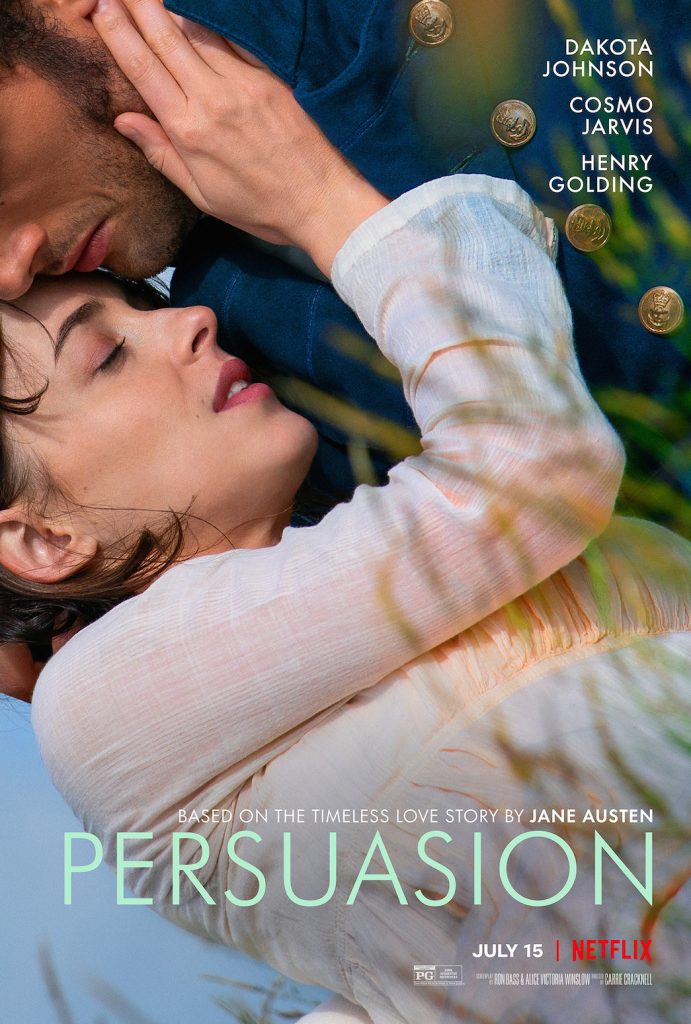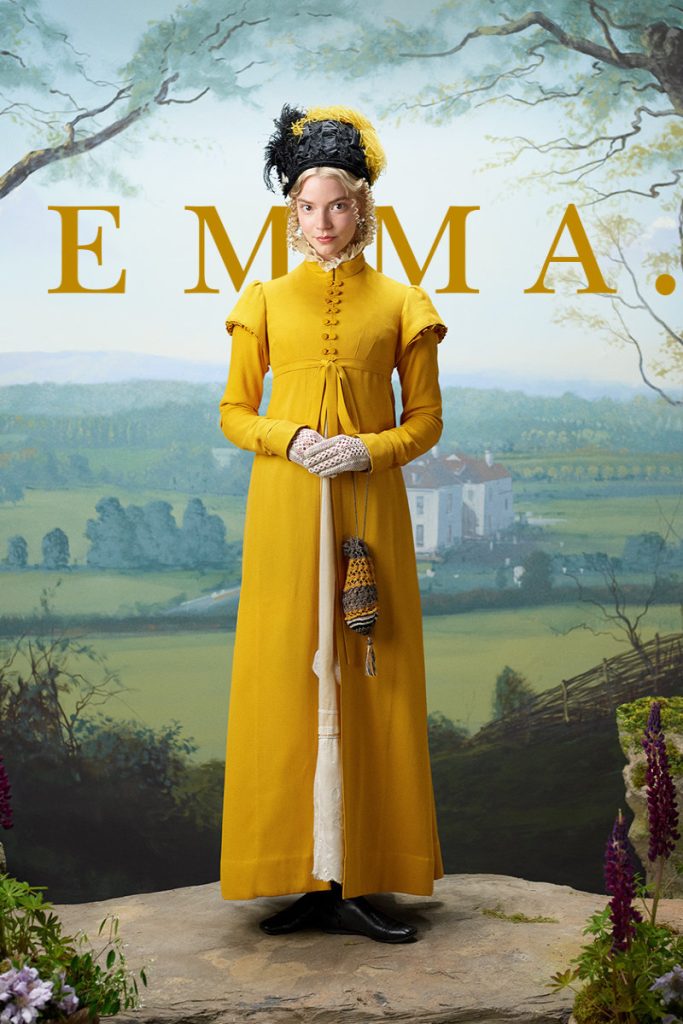What was it that Shakespeare said? “My kingdom for a decent adaptation of Persuasion?” Some versions have gotten close, but we’ve yet to land on a definitive take (unlike, say, Pride and Prejudice, which is done, now please leave it alone forever). The latest brave soul to take a crack at Jane Austen’s final novel is Netflix, who takes misinterpretation of the source material to soaring new heights in an adaptation that is not only just plain bad, but bafflingly off-base. And it seems that many of us have taken that personally. By now, plenty of hilariously dramatic thinkpieces have been written on the ways in which this version fails. But all the hubbub got me thinking: there have been plenty of terrible movie adaptations of beloved books before. Why is this one so offensive?
First and most obviously, it takes Austen’s most mature, melancholic, pensive work about lost love and regret and tries to jam it into the shape of a romantic comedy. Then there’s the questionable dialogue, which switches wildly between the 19th and 21st centuries without any rhyme or reason (there’s a scene where protagonist Anne Elliot’s sister asks her how she would dance to Beethoven. Anne: “Alone in my room, with a bottle of red.” Where is the Beethoven playing from, in this scenario? Her Spotify account?), and also has the subtlety of a sledgehammer (I particularly enjoyed the scene where the mustache-twirling villain Mr. Elliot fully lays out his dastardly plans to sabotage Anne’s father’s relationship in the style of a Bond villain—and Anne has no problem going shopping with him later). The romantic lead Captain Wentworth—who carries himself with a dignified, wounded pride in the novel—has the air of a boxer who has taken one too many hits, always seeming a bit dazed; I have a hard time believing this version of him could craft the iconic “I am half-agony, half-hope” letter.
Don’t get me wrong: I love a creative take on the past. Everything that Alena Smith did with the show Dickinson defies logic but somehow just works. The show proves that someone with a deep well of knowledge and reverence for the source material (in this case, Emily Dickinson’s life and poetry) can make something unique but still respectful to the source. It’s also an example of how to use anachronistic lingo to translate themes for a young, modern audience (one of my favourite instances is the way characters treat new serial chapters of Charles Dickens’s Bleak House like new episodes of Game of Thrones: “I’m honestly gonna die if we don’t find out who Esther’s mother is soon” “No spoilers!!”). This goes for modern interpretations of Austen’s work as well: Clueless, Bridget Jones’s Diary, and Fire Island take their structure, character designs, and themes from her novels while making them into something entirely new. Those who know the books can recognize Austen’s touch, but the films work perfectly well on their own.
Where Persuasion (2022) fails so spectacularly is the complete dismissal of anything resembling what Austen intended. Anne is so bubbly and lively that it’s hard to believe the loss of Wentworth had any real effect on her (also, would someone with her strong, vibrant character really have been “persuaded” to give him up? And would she truly make it to the spinstery age of 27 without catching another man’s attention?). It’s like the writers flipped through the novel’s pages with a red pen, crossing out whatever didn’t appeal to them like the FOX censor in that Simpsons episode. “Not quirky enough!” I imagine them saying, “Anne needs to be at least three times more girlboss.” In trying to morph Persuasion into something it is patently not, the film cobbles together a Frankenstein’s monster of parts from more successful media. It steals shots directly from 2020’s Emma. It copies the fourth wall breaking of Fleabag (to, like, an insane degree). It turns its protagonist from a sedate, modest woman into a messy Bridget Jones type, who cries in the bathtub while drinking wine straight from the bottle. To reduce Anne to a dated stereotype of a rom-com heroine is genuinely insulting to Austen, her fans, and to the intellect of the general movie-watcher (in one scene Anne literally tries to pee against a tree and then falls over. Because she is so quirky and clumsy).
And this is what, I think, is causing such an uproar: it’s not just bad, it’s wildly disrespectful to the revered source material. I can recall being equally irate over the 2008 film of Brideshead Revisited, which, like Persuasion, is one of my favourite books. While the 1981 miniseries is the gold standard for how to faithfully translate a novel for the screen, the later film version plays fast and loose with the word “adaptation”: it neuters the looming spectre of Catholicism; it downplays protagonist Charles’s unambiguous love for Sebastian (it’s on the page, people!); it shies away from the nostalgia for a declining aristocracy. It sacrifices the main themes in favour of an invented love triangle that does not exist in the book, thereby missing the entire point. We’re left with nothing but the question: “Why did you make this?” Persuasion is similar. Why tarnish these books like this? Just make an original movie!
For a palate cleanser, check out some Austen adaptations that are way less infuriating:
- Pride and Prejudice (2005) (and also the 1995 miniseries, so no one yells at me)
- Emma (2009) and Emma (2020)
- Sense and Sensibility (1995)
- Persuasion (1995) (we don’t carry the 2007 version in our catalogue, but it’s worth seeking out)
- Love & Friendship (2016)


100% agreed oh my goodness. As soon as I saw that Dakota Johnson was playing Anne I knew it was doomed (she’s an ok actress but I didn’t think she could really capture Anne), though I gave the trailer a shot and….was immediately not only disappointed but infuriated. My mom and I called this adaptation the Hollywood-ification of Austen’s work, but I think you’re right: it’s just a flagrantly disrespectful ‘adaptation’. “Anne needs to be at least three times more girlboss” is absolutely the vibe this gave and also made me cackle out loud.
You know, I tried to give Dakota Johnson the benefit of the doubt, because I do generally like her. Alas. Someone online said putting her in an Austen movie is like the time they left a Starbucks cup in Game of Thrones, and I feel like that really nails it. You’re totally right, this is absolutely a “Hollywood-ification” of the story, which I guess explains why they tried to make it a romantic comedy (since Hollywood understands, like, 4 types of movies). I just discovered that the screenwriter is American, so….Here’s hoping the next adaptation is better!
My favourite online response was ‘she has a face that knows what a cell phone is’ which absolutely sent me. But yeah, here’s hoping! In the meantime I will sink into the warm melancholy of the 1995 version!